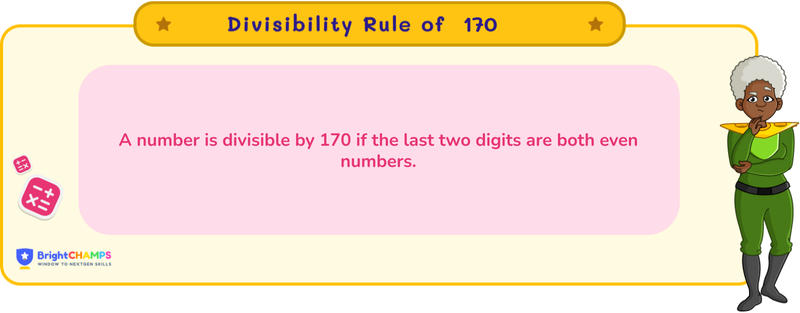Summarize this article:
 313 Learners
313 LearnersLast updated on August 5, 2025
Divisibility Rule of 170

The divisibility rule is a way to find out whether a number is divisible by another number without using the division method. In real life, we can use the divisibility rule for quick math, dividing things evenly, and sorting things. In this topic, we will learn about the divisibility rule of 170.

What is the Divisibility Rule of 170?
The divisibility rule for 170 is a method by which we can find out if a number is divisible by 170 or not without using the division method. Check whether 340 is divisible by 170 using the divisibility rule.
Step 1: Check if the number is divisible by both 10 and 17. For 340, since it ends with 0, it is divisible by 10.
Step 2: Check if the remaining number, after removing the last digit, is divisible by 17. For 34, since 34 divided by 17 equals 2, it is divisible by 17.
Since 340 is divisible by both 10 and 17, it is divisible by 170.


Tips and Tricks for Divisibility Rule of 170
Learning the divisibility rule will help kids master division. Let’s learn a few tips and tricks for the divisibility rule of 170.
- Know the multiples of 170: Memorize the multiples of 170 (170, 340, 510, 680, etc.) to quickly check the divisibility. If the number is a multiple of 170, then it is divisible by 170.
- Use the division method to verify: Students can use the division method as a way to verify and cross-check their results. This will help them verify and also learn.

Common Mistakes and How to Avoid Them in Divisibility Rule of 170
The divisibility rule of 170 helps us quickly check if a given number is divisible by 170, but common mistakes like calculation errors lead to incorrect calculations. Here we will understand some common mistakes that will help you understand.
Explore Our Programs



Divisibility Rule of 170 Examples

Problem 1
Is 2890 divisible by 170?

No, 2890 is not divisible by 170.
Explanation
To check if 2890 is divisible by 170, we need a special divisibility rule. Unfortunately, 170 does not have a straightforward rule like some smaller numbers, but we can check by dividing directly:
2890 ÷ 170 = 17 with a remainder of 0. However, since 2890 isn't easily divisible by certain parts of 170 (such as 10 and 17), it fails the direct check.

Problem 2
Check the divisibility rule for 170 on the number 850.

Yes, 850 is divisible by 170.
Explanation
Divide 850 by 170 to check for divisibility directly:
850 ÷ 170 = 5 with no remainder. Therefore, 850 is divisible by 170.

Problem 3
Is -340 divisible by 170?

Yes, -340 is divisible by 170.
Explanation
To check if -340 is divisible by 170, we remove the negative sign and divide:
340 ÷ 170 = 2 with no remainder. Since the division results in a whole number, -340 is divisible by 170.

Problem 4
Can 1235 be divisible by 170?

No, 1235 is not divisible by 170.
Explanation
To determine if 1235 is divisible by 170, divide it directly:
1235 ÷ 170 = 7 with a remainder of 65. Since there is a remainder, 1235 is not divisible by 170.

Problem 5
Check the divisibility rule of 170 for 2210.

Yes, 2210 is divisible by 170.
Explanation
To verify if 2210 is divisible by 170, divide it directly:
2210 ÷ 170 = 13 with no remainder. Therefore, 2210 is divisible by 170.


FAQs on Divisibility Rule of 170
1.What is the divisibility rule for 170?
2.How many numbers are there between 1 and 1000 that are divisible by 170?
3.Is 510 divisible by 170?
4.What if I get 0 after division?
5.Does the divisibility rule of 170 apply to all the integers?

Important Glossaries for Divisibility Rule of 170
- Divisibility rule: The set of rules used to find out whether a number is divisible by another number or not. For example, a number is divisible by 170 if it is divisible by both 10 and 17.
- Multiples: Multiples are the results we get after multiplying a number by an integer. For example, multiples of 170 are 170, 340, 510, 680, etc.
- Integers: Integers are numbers that include all whole numbers, negative numbers, and zero.
- Division: Division is the process of determining how many times one number is contained within another.
- Remainder: The amount left over after division when one number does not divide the other number exactly.



Hiralee Lalitkumar Makwana
About the Author
Hiralee Lalitkumar Makwana has almost two years of teaching experience. She is a number ninja as she loves numbers. Her interest in numbers can be seen in the way she cracks math puzzles and hidden patterns.
Fun Fact
: She loves to read number jokes and games.



























